



















 .
|
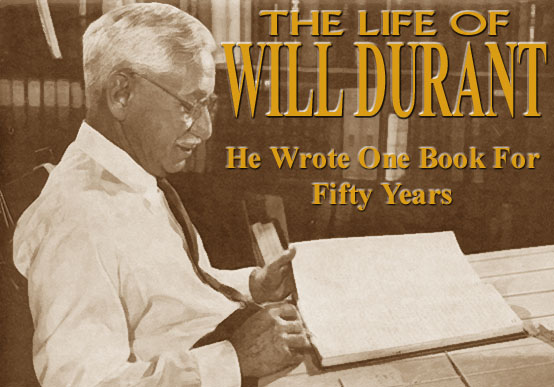
Anybody can make
history. Only a great man can write it.
- Oscar Wilde
Fifty years of writing a book may
seem like a long period of authorship, but there is a lengthy
work that took a full five decades to write. The book is The
Story of Civilization, and the man was Will Durant.
He was once called William James
Durant. His pious French-Canadian mother had chosen the name
in deference to one of Christ’s apostles, however, rather
than out of respect (or even knowledge) of the famed American
psychologist-philosopher. In time, the youth became a compromise
of sorts; becoming an apostle for philosophy.
First, however, Durant was destined
for holy orders. Born in North Adams, Massachusetts, in 1885,
he studied in Catholic parochial schools there and in Kearny,
New Jersey. His teachers were nuns, and he practiced his religion
so fervently that no one doubted that he would become a priest.
In 1900 he entered St. Peter's Academy and College in Jersey
City, where his teachers were Jesuits, and, one of these, Father
McLaughlin, urged him to enter the Jesuit Order following his
graduation in 1907.
But in 1903 he discovered the works
of some alluring infidels in the Jersey City Public Library
-- Darwin, Huxley, Spencer and Haeckel. Biology, with its Nature "red
in tooth and claw," did some harm to his faith, and suddenly,
in his 18th year, it dawned upon him that he could
not honestly dedicate himself to the priesthood – but
how could he break the news to his mother, who had pinned her
hopes, both for this world and the next, on offering her son
in service to God?
The outcome was extraordinary, for,
while Durant was losing one faith, he was taking on another
in compensation. In 1905 he exchanged his devotion for Socialism.
An earthly paradise, he felt, would compensate for the heaven
lost in the glare of biology. Another youth attending the same
college was suffering a similar and simultaneous infection,
for he, too, had been headed for the clergy. To both boys occurred
the fascinating idea of pleasing proud parents by entering
the priesthood – but, once in, they would work to convert
the American Catholic Church to socialism. For a time, some
inkling of the size of the enterprise deterred the conspirators,
but they failed to heed the warning.
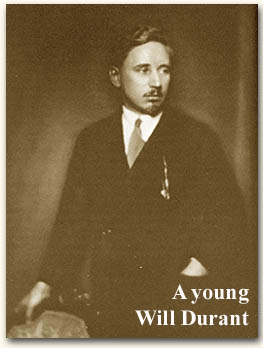 Graduating in 1907, Durant persuaded Arthur
Brisbane to offer him employment as a cub reporter -- at the
princely sum of ten dollars a week -- on the New York Evening
Journal. This was a heady change from the young man's youthful
piety, for the evening papers of New York in that summer were
featuring rape cases. The young man, dizzy with Socialism but
still mindful of his morals, found himself pursuing sex criminals,
day after day. The occupation turned his stomach, and a kindly
editor advised him to keep an eye out for some less strenuous
occupation. In the fall of 1907, he subsided into teaching
Latin, French, English and geometry in Seton Hall College,
South Orange, New Jersey. And at last, in 1909, he and his
secret associate entered the seminary that was attached to
the college and set about their earlier devised task of impregnating
Thomas Aquinas with Karl Marx. Graduating in 1907, Durant persuaded Arthur
Brisbane to offer him employment as a cub reporter -- at the
princely sum of ten dollars a week -- on the New York Evening
Journal. This was a heady change from the young man's youthful
piety, for the evening papers of New York in that summer were
featuring rape cases. The young man, dizzy with Socialism but
still mindful of his morals, found himself pursuing sex criminals,
day after day. The occupation turned his stomach, and a kindly
editor advised him to keep an eye out for some less strenuous
occupation. In the fall of 1907, he subsided into teaching
Latin, French, English and geometry in Seton Hall College,
South Orange, New Jersey. And at last, in 1909, he and his
secret associate entered the seminary that was attached to
the college and set about their earlier devised task of impregnating
Thomas Aquinas with Karl Marx.
The College had an excellent library,
and Durant was made librarian. It was there, as he moved affectionately
among the books, that he learned of the man who, beyond any
other thinker, would shape his life. Spinoza's Ethics Geometrically
Demonstrated was a revelation to him in its heretical content
and its mathematical method -- but, above all, in the personality
it revealed of a philosopher actually living his philosophy,
merging practice and precept, and dedicating himself, in poverty,
simplicity and sincerity, to an attempt to understand the world.
Almost memorizing that book, Durant then came to see very clearly
the absurdity of his conspiracy, and he shuddered at the lifelong
insincerity it would have imposed upon him. In 1911 he left
the Seminary, his only possessions four books and $40, and
migrated to New York. A separation between Durant and his parents
ensued, and it was years before his mother and father would
forgive him.
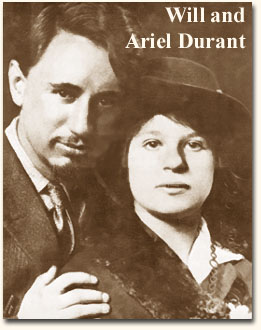 From a peaceful and orderly seminary existence, Durant
passed on to the most radical circles in the "bedlam" of
Manhattan. He tried -- and failed -- to convert Emma Goldman
and Alexander Berkman from anarchism to socialism. In 1911,
he became the teacher and (as he put it) chief pupil of the
Ferrer Modern School, an experiment in libertarian education.
A sponsor of the school, Alden Freeman, took a fancy to the
shy instructor and treated him to a summer tour of Europe to "broaden
his borders." Returning to the States, Durant fell in
love with one of his pupils, whose sprightly vivacity led him
to call her "Puck" and, in his writings, "Ariel" --
the names by which she became known to the rest of the world. From a peaceful and orderly seminary existence, Durant
passed on to the most radical circles in the "bedlam" of
Manhattan. He tried -- and failed -- to convert Emma Goldman
and Alexander Berkman from anarchism to socialism. In 1911,
he became the teacher and (as he put it) chief pupil of the
Ferrer Modern School, an experiment in libertarian education.
A sponsor of the school, Alden Freeman, took a fancy to the
shy instructor and treated him to a summer tour of Europe to "broaden
his borders." Returning to the States, Durant fell in
love with one of his pupils, whose sprightly vivacity led him
to call her "Puck" and, in his writings, "Ariel" --
the names by which she became known to the rest of the world.
In order to marry her, in 1913 he
resigned his post as teacher and supported himself and her
by lecturing for five and ten-dollar fees, while Alden Freeman
paid his tuition in the graduate schools of Columbia University.
There, Durant took biology under Morgan and McGregor, psychology
under Woodworth and Poffenberger and philosophy under Woodbridge
and the legendary John Dewey.
Shortly thereafter, the arrival
of his daughter, Ethel, slowly changed Durant's philosophy.
Faced with the daily miracle of living growth, he shed his
youthful atheism and returned to a more vital conception of
the world. In his "mental" -- but not literal --autobiography, Transition (1927),
he expressed the change with youthful sentiment:
Even before Ethel's coming I had
begun to rebel against that mechanical conception of mind
and history which is the illegitimate offspring of our industrial
age: I had suspected that the old agricultural view of the
world in terms of seed and growth did far more justice to
the complexity and irrepressible expansiveness of things.
But when Ethel came, I saw how some mysterious impulse, far
outreaching the categories of physics, lifted her up, inch-by-inch
and effort by effort, on the ladder of life. I felt more
keenly than before the need of a philosophy that would do
justice to the infinite vitality of nature. In the inexhaustible
activity of the atom, in the endless resourcefulness of plants,
in the teeming fertility of animals, in the hunger and movement
of infants, in the laughter and play of children, in the
love and devotion of youth, in the restless ambition of fathers
and the lifelong sacrifice of mothers, in the undiscourageable
researches of scientists and the sufferings of genius, in
the crucifixion of prophets and the martyrdom of saints --
in all things I saw the passion of life for growth and greatness,
the drama of everlasting creation. I came to think of myself,
not as a dance and chaos of molecules, but as a brief and
minute portion of that majestic process ... I became almost
reconciled to mortality, knowing that my spirit would survive
me enshrined in a fairer mold ... and that my little worth
would somehow be preserved in the heritage of men. In a measure
the Great Sadness was lifted from me, and, where I had seen
omnipresent death, I saw now everywhere the pageant and triumph
of life.
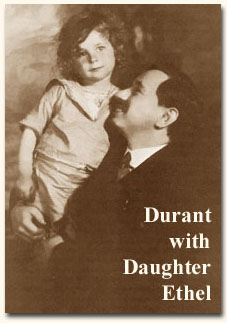 The birth of his daughter had the further effect
of ending the long separation between Durant and his mother.
Mother Durant came to see the infant -- what grandparent can
resist a grandchild? – and, in a glow of contentment,
she exclaimed, "It's a Durant!" The birth of his daughter had the further effect
of ending the long separation between Durant and his mother.
Mother Durant came to see the infant -- what grandparent can
resist a grandchild? – and, in a glow of contentment,
she exclaimed, "It's a Durant!"
In those years of plain living and
eager study, he paid little attention to history, which seemed
so discouraging a record of slaughter and politics. But Brisbane
had led him to read Buckle's Introduction to the History
of Civilization, as a guide to a more philosophical understanding
of man's past. Durant was deeply moved when he learned that
Buckle had died in Damascus, after writing merely the introduction
to what had been planned as a history of civilization, from
its origins to the 19th century. Durant resolved
to undertake the same task -- but he was 41 before he was free
to begin. Meanwhile, almost every day, he began to gather material.
In 1917, as a requirement for the
doctorate in philosophy, Will Durant wrote his first book, Philosophy
and the Social Problem, which argued that philosophy was
languishing because it avoided the actual problems of society.
The exuberant young author proposed to view these problems
from the perspective of philosophy and suggested that specific
training in administration should be made a qualification for
public office. He received his degree in 1917 and began to
teach the "dear delight" as an instructor in Columbia
University. But World War I disrupted his classes, and he was
politely dismissed from his post.
Meanwhile, in a former Presbyterian
Church now called Labor Temple, at 14th Street and
2nd Avenue, New York, he had begun those lectures
on the history of philosophy, literature, science, music, and
art which prepared him to write The Story of Philosophy and The
Story of Civilization. For his audiences there were mostly
men and women who demanded both clarity of exposition and some
contemporary significance in all historical studies. In 1921
he organized Labor Temple School, which devoted itself to adult
education.
One Sunday afternoon of that year,
E. Haldeman-Julius, publisher of the famous Little Blue Books,
happened to pass Labor Temple and noted from the announcement
board that at 5 p.m. Durant would talk on Plato. The publisher
entered, liked the lecture and later, from Girard, Kansas,
wrote and asked Durant to turn that lecture into one of his
little five-cent Blue Book publications. Durant initially refused,
on the ground that his other work was taking up all his time.
Here, at the outset, his literary career might have come to
an end. But Julius wrote again and enclosed advance payment.
Durant yielded and then again absorbed himself in teaching,
but Julius asked for a booklet on Aristotle -- again sending
payment in advance. This, too, was written, and again Durant
thought the relationship was ended. But the enterprising publisher
persisted until 11 booklets were delivered to him. History
would prove that these enterprises, undertaken very much against
his will, would create what would ultimately become a best
seller, for the 11 booklets became The Story of Philosophy.
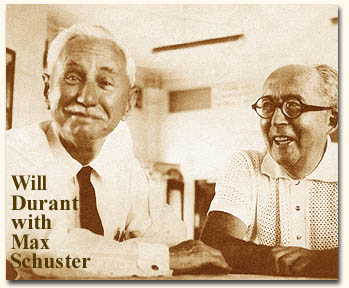 The amazing success of this book is an old
story in publishing circles. Dick Simon and Max Schuster, of
the new publishing firm Simon and Schuster, took over the booklets
and made them into a handsome volume. Durant expected a sale
of some 1,100 copies, and the optimistic publishers predicted
1,500. It was assumed that the subject and price – five
dollars in 1926 -- would frighten readers away. But a favorable
review by Henry Forman in the New York Times sent the
book off to a good start. In a few years it sold 2,000,000
copies. To this day it is still capturing new readers in America
and has found many abroad, in its translations into Chinese,
Czech, Danish, Dutch, Finnish, German, French, Hebrew, Hungarian,
Italian, Japanese, Norwegian, Polish, Portuguese, Serbo-Croatian,
Spanish and Swedish. The amazing success of this book is an old
story in publishing circles. Dick Simon and Max Schuster, of
the new publishing firm Simon and Schuster, took over the booklets
and made them into a handsome volume. Durant expected a sale
of some 1,100 copies, and the optimistic publishers predicted
1,500. It was assumed that the subject and price – five
dollars in 1926 -- would frighten readers away. But a favorable
review by Henry Forman in the New York Times sent the
book off to a good start. In a few years it sold 2,000,000
copies. To this day it is still capturing new readers in America
and has found many abroad, in its translations into Chinese,
Czech, Danish, Dutch, Finnish, German, French, Hebrew, Hungarian,
Italian, Japanese, Norwegian, Polish, Portuguese, Serbo-Croatian,
Spanish and Swedish.
It was this windfall that enabled
Durant to realize at last the ambition that had stirred within
him when he read of Buckle's abortive dream. He retired from
teaching and began work on his own history of civilization,
though, for a time, he allowed himself to be distracted by
writing magazine articles for tempting fees. Many of these
essays were collected into The Mansions of Philosophy (1929),
later to be reprinted as The Pleasures of Philosophy. But
in 1929 he turned his back on Mammon and resolved that he would
devote the remainder of his life to The Story of Civilization. He
used the word "story" to suggest his belief that
the narrative would be intelligible to any high school graduate,
but the word has misled many into thinking of this monumental
production as popularization. Those who wade into the volumes
are surprised to find them marked by painstaking scholarship,
by profuse detail, and by the philosophical perspective that
recalls Spengler's wish that only philosophers would write
history.
Originally, Durant planned to divide
the work into five volumes, to appear at five-year intervals.
For the first volume, Our Oriental Heritage (1935),
he circled the globe twice and wrote and rewrote its 1,049
pages in longhand, through six years, giving the history of
Asiatic civilization from the beginnings to Gandhi and Chiang
Kai-shek. In the preface he explained his purpose and method:
I have tried in this book to accomplish
the first part of a pleasant assignment which I rashly laid
upon myself some 20 years ago, to write a history of civilization.
I wish to tell as much as I can, in as little space as I
can, of the contributions that genius and labor have made
to the cultural heritage of mankind - to chronicle and contemplate,
in their causes, character and effects, the advances of invention,
the varieties of economic organization, the experiments in
government, the aspirations of religion, the mutations of
morals and manners, the masterpieces of literature, the development
of science, the wisdom of philosophy and the achievements
of art. I do not need to be told how absurd this enterprise
is, or how immodest is its very conception, for many years
of effort have brought it to but a fifth of its completion
and have made it clear that no one mind, and no single lifetime,
can adequately compass this task. Nevertheless I have dreamed
that, despite the many errors inevitable in this undertaking,
it may be of some use to those upon whom the passion for
philosophy has laid the compulsion to try and see things
whole, to pursue perspective, unity and understanding through
history in time, as well as to seek them through science
in space.
I have long felt
that our usual method of writing history in separate longitudinal
sections
-- economic history, political history, religious history,
the history of philosophy, the history of literature, the
history of science, the history of music, the history of
art -- does injustice to the unity of human life; that
history should be written collaterally as well as lineally,
synthetically
as well as analytically; and that the ideal historiography
would seek to portray in each period the total complex
of a nation's culture, institutions, adventures and ways. But
the accumulation of knowledge has divided history, like
science,
into a thousand isolated specialties, and prudent scholars
have refrained from attempting any view of the whole --
whether of the material or of the living past of our race.
For the
probability of error increases with the scope of the undertaking,
and any man who sells his soul to synthesis will be a tragic
target for a myriad merry darts of specialist critique. "Consider," said
Ptah-hotep 5,000 years ago, "how thou mayest be opposed
by an expert in council. It is foolish to speak on every
kind of work." A history of civilization shares the
presumptuousness of every philosophical enterprise: It
offers the ridiculous spectacle of a fragment expounding
the whole.
Like philosophy, such a venture has no rational excuse
and is at best but a brave stupidity, but let us hope that,
like
philosophy, it will always lure some rash spirits into
its fatal depths.
That same preface contained some
prophetic lines, written in 1934:
At this historic moment -- when
the ascendancy of Europe is so rapidly coming to an end,
when Asia is swelling with resurrected life, and the theme
of the 20th century seems destined to be an all-embracing
conflict between the East and the West -- the provincialism
of our traditional histories, which began with Greece and
summed up Asia in a line, has become no merely academic error,
but a possibly fatal failure of perspective and intelligence.
The future faces into the Pacific, and understanding must
follow it there.
Volume II, The Life of Greece (1939),
applied the "integral method" to Hellenic culture
from its oldest antecedents in Crete and Asia to its envelopment
by Rome. In the preface he proposed an all-embracing plan:
I wish to see and feel this complex
culture not only in the subtle and impersonal rhythm of its
rise and fall, but in the rich variety of its vital elements:
its ways of drawing a living from the land and of organizing
industry and trade; its experiments with monarchy, aristocracy,
democracy, dictatorship and revolution; its manners and morals;
its religious practices and beliefs; its education of children
and its regulation of the sexes and the family; its poems
and temples, markets and theaters and athletic fields; its
poetry and drama; its painting, sculpture, architecture and
music; its sciences and inventions; its superstitions and
philosophy. I wish to see and feel these elements, not in
their theoretical and scholastic isolation, but in their
living interplay as the simultaneous movement of one great
cultural organism, with a hundred organs and a hundred million
cells, but with one body and one soul.
Volume III, Caesar and Christ (1944),
told the story of Rome from Romulus to Constantine. In construction,
this volume is the best of Durant's books, moving as it does
with dramatic interest from Etruscan caves to Christian catacombs.
Maurice Maeterlinck sent from France an enthusiastic tribute:
This book is a magnificent
success, worthy of the greatest histories of mankind. It
is as complete
as an encyclopedia, but instead of being the moth-eaten labor
of an obscure compiler, it is the product of a great writer
and a great artist, and each of the pages is a page from
an anthology. The work has a continuous flow. It is luminous
and without blemish. It has none of the defects of the "best
sellers" composed of endless twaddle, paddings and platitudes.
Dr. Durant's pen seems to clarify, to light up, to simplify
everything it touches. At times one would believe he was
listening to Montesquieu.
Volume IV, The Age of Faith (1950),
was another Leviathan, running to 1,196 pages, but it covered
three civilizations -- Christian, Moslem and Judaic -- through
a thousand years, from Constantine to Dante, A. D. 325 to 1321.
It included some 200 pages on Mohammedan culture in its great
days at Baghdad, Cairo and Cordova. Never before has a Christian
scholar, in one volume on the Middle Ages, given such ample
recognition to the achievements of Islam in government, literature,
medicine, science and philosophy. And the three chapters on
medieval Jewish life show a surprisingly sympathetic understanding
of what might have seemed an alien culture. Professor Allan
Nevins, of Columbia University, wrote of this book:
I was specially pleased to have
Will Durant's The Age of Faith, which seems to me a very
remarkable feat of synthesis and interpretation. I regard
it as the best general account of medieval civilization in
print. Mr. Durant's great series of books should in time
become recognized -- if it is not already -- as one of the
outstanding works in American historiography.
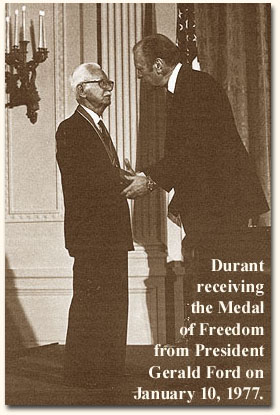 Volume V, The Renaissance (1953), exemplifies
Durant's integral method by covering every phase of that exuberant
epoch in Italy. It began with Petrarch and Boccaccio in the
14th century, went on to Florence with the Medici
and the artists and humanists and poets who made Florence a
very Athens; told the tragic tale of Savonarola; passed on
to Milan with Leonardo da Vinci; to Umbria with Piero delta
Francesca and Perugino; to Mantua with Mantegna and Isabella
d'Este; to Ferrara with Ariosto; to Venice with Giorgione,
the Bellini and Aldus Manutius; to Parina with Correggio; to
Urbino with Castiglione; to Naples with Alfonso the Magnanimous;
to Rome with the great Renaissance popes and their patronage
of Raphael and Michelangelo; to Venice again with Titian, Aretino,
Tintoretto and Veronese; and back to Florence with Cellini. Volume V, The Renaissance (1953), exemplifies
Durant's integral method by covering every phase of that exuberant
epoch in Italy. It began with Petrarch and Boccaccio in the
14th century, went on to Florence with the Medici
and the artists and humanists and poets who made Florence a
very Athens; told the tragic tale of Savonarola; passed on
to Milan with Leonardo da Vinci; to Umbria with Piero delta
Francesca and Perugino; to Mantua with Mantegna and Isabella
d'Este; to Ferrara with Ariosto; to Venice with Giorgione,
the Bellini and Aldus Manutius; to Parina with Correggio; to
Urbino with Castiglione; to Naples with Alfonso the Magnanimous;
to Rome with the great Renaissance popes and their patronage
of Raphael and Michelangelo; to Venice again with Titian, Aretino,
Tintoretto and Veronese; and back to Florence with Cellini.
The preface to Volume VI, The
Reformation, describes the book and reveals the man:
We begin by considering religion
in general, its functions in the soul and the group and the
conditions and problems of the Roman Catholic Church in the
two centuries before Luther. We shall watch England and Wyclif
in 1376-82, Germany and Louis of Bavaria in 1320-47, Bohemia
and Huss in 1402-85, rehearsing the ideas and conflicts of
the Lutheran Reformation. And, as we proceed, we shall note
how social revolution, with communistic aspirations, marched
hand-in-hand with religious revolt. We shall weakly echo
Gibbon's chapter on the fall of Constantinople and, shall
perceive how the advance of the Turks to the gates of Vienna
made it possible for one man to defy at once an emperor and
a pope. We shall consider sympathetically the efforts of
Erasmus for the peaceful self-return of the Church. We shall
study Germany on the eve of Luther and may thereby come to
understand how inevitable he was when he came.
In Book II, the Reformation proper
will hold the stage, with Luther and Melanchthon in Germany,
Zwingli and Calvin in Switzerland, Henry VIII in England,
Knox in Scotland and Gustavus Vasa in Sweden, with a side
glance at the long duel between Francis I and Charles V.
And other aspects of European life in that turbulent half-century
(1517-64) will be postponed in order to let the religious
drama unfold itself without confusing delays.
Book III, will
look at "the
strangers in the gate": Russia and the Ivans and the
Orthodox Church; Islam and its changing creed, culture and
power; and the struggle of the Jews to find Christians in
Christendom. Book IV will go "behind the scenes" to
study the law and economy, morals and manners, art and
music, literature and science and philosophy of Europe
in the age
of Luther. In Book V we shall be forced to admire the calm
audacity with which she weathered the encompassing storm.
In a brief Epilogue we shall try to see the Renaissance
and the Reformation, Catholicism and the Enlightenment,
in the
large perspective of modern history and thought.
Can so controversial a subject be
treated impartially? Durant professes to have tried but, as
yet, his success is difficult to assess. His preface concludes
disarmingly:
It is a fascinating but difficult
subject, for almost every word that one may write about it
can be disputed or give offense. I have tried to be impartial,
though I know that a man's past always colors his views,
and that nothing else is so irritating as impartiality. The
reader should be warned that I was brought up a fervent Catholic,
and that I retain grateful memories of the devoted secular
priests, and learned Jesuits, and kindly nuns, who bore so
patiently with my brash youth. But he should note, too, that
I derived much of my education from lecturing for 13 years
in a Presbyterian Church under the tolerant auspices of sterling
Protestants like Jonathan C. Day, William Adams Brown, Henry
Sloane Coffin and Edmund Chaffee, and that many of my most
faithful auditors in that Presbyterian Church were Jews,
whose search for education and understanding gave me a new
insight into their people. Less than any other man have I
excuse for prejudice, and I feel for all faiths the warm
sympathy of one who has come to learn that even the trust
in reason is a precarious faith, and that we are all fragments
of darkness groping for the sun. I know no more about the
ultimates than the simplest urchin in the streets.
What was he like, this patient Sisyphus
of history, who every five years rolled a heavy volume up the
high hills of scholarship and to the pinnacle of print, only
to begin at the bottom again? A labor he would indulge in until
no less than eleven volumes of The Story of Civilization were
completed. We know that he was awarded the Pulitzer Prize for
the tenth volume in the series (along with his wife, Ariel,
who became his collaborator on the series after Volume VII:
The Age of Reason).
Photographs reveal Durant to be
a man of sparkling eyes and abundant hair, dressed immaculately.
Even those who were not friends spoke well of him. Durant embodied
the two qualities that he once declared no philosophy or philosopher
was complete without: understanding and forgiveness.
He never once attempted to build
his reputation at the expense of others; instead he sought
to better understand the viewpoints of human beings, and to
forgive them their foibles and human waywardness. When two
burglars were apprehended by police after having broke into
his Los Angeles home and stealing valuable jewelry and savings
bonds – Durant refused to press charges and insisted that
they be set free. "Forgiveness," again, is the other
half of philosophy.
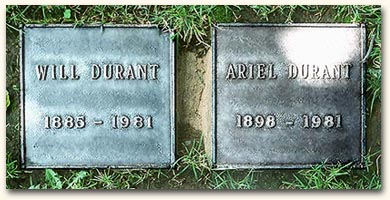 Durant’s love for his wife Ariel only
deepened with the passing of time. When he was admitted to
hospital with heart problems in 1981 at the age of 96, his
wife stopped eating; perhaps fearing that he would not be returning.
When Durant learned of the death of his beloved wife, his own
heart stopped beating. They are buried beside each other in
a small Los Angeles cemetery, together for all eternity. Durant’s love for his wife Ariel only
deepened with the passing of time. When he was admitted to
hospital with heart problems in 1981 at the age of 96, his
wife stopped eating; perhaps fearing that he would not be returning.
When Durant learned of the death of his beloved wife, his own
heart stopped beating. They are buried beside each other in
a small Los Angeles cemetery, together for all eternity.
Unlike the cloistered academics
who turned up their noses at Durant’s attempt to bring
philosophy back to the common man, Durant was not content merely
to write about such subjects, he actually did his best to put
his ideas into effect. He had fought for equal wages, women’s
suffrage and fairer working conditions for the American labor
force. Durant had even drafted a "Declaration of Interdependence" in
the early 1940s – preceding the "Civil Rights Movement" by
some two decades – calling for, among many things:
Human dignity and decency,
and to safeguard these without distinction of race or color
or
creed; to strive in concert with others to discourage animosities
arising from these differences, and to unite all groups in
the fair play of civilized life…Rooted in freedom, children
of the same Divine Father, sharing everywhere a common human
blood, we declare again that all men are brothers, and that
mutual tolerance is the price of liberty.
He pursued this issue of racial
equality so vigorously that this Declaration was introduced
into the Congressional Record on October 1, 1945.
Over the years, Durant’s reputation
as a philosopher and historian has grown; his writings, which
have sold over 17 million copies, have been enjoyed by individuals
from all walks of life. Among his most impassioned readers
(and friends) were Mahatma Gandhi, George Bernard Shaw, Clarence
Darrow and Bertrand Russell – although it was always for
the common man, rather than the scholastic or academic audience,
that Durant wrote.
"We could do almost anything
if time would slow up," he once said, adding "but
it runs on, and we melt away trying to keep up with it." And
yet even time never covered 110 centuries in fifty years.
By the editors of Wisdom magazine
and John Little
.
|